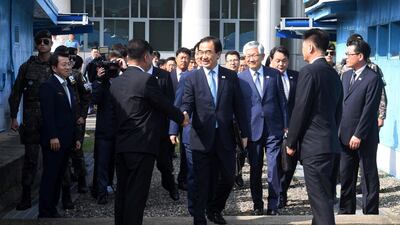South Korea’s President Moon Jae-in agreed to hold his third meeting this year with Kim Jong-un in Pyongyang in September, as both leaders strive to keep a peace initiative going in the face of misgivings across the diplomatic community.
The task for Mr Moon as he becomes the first southern president to visit the Communist capital since 2007 is maintaining momentum for inter-Korean dialogue, while also nudging Mr Kim to make progress on denuclearisation with the US.
The 36-year-old North Korean dictator agreed to nuclear disarmament in a meeting with President Donald Trump in Singapore in June. In return the US leader agreed to wide-ranging negotiations with North Korea and made a major concession by cancelling American war games with the South Korean military.
Doubts over Pyongyang’s commitment to a disarmament deal stems from a series of broken agreements stretching from the mid-1990s to the failed “Leap Day Deal” in 2012. Two separate reports in US newspapers last month revealed details of a continuing North Korean build-up. One report said it was expanding a missile manufacturing facility. The second revealed construction of new models at the plant where the country’s first intercontinental missile was produced.
North Korea has rejected the US demands for specific concessions up front. US officials have briefed that Washington wants a specific proportion of its weapons handed over at the outset of the process.
American politicians have turned up the heat on the White House on the overture to North Korea. Richard Blumenthal, a Democrat senator, declared on Twitter that Mr Trump’s strategy had failed and “only North Korea” was winning.
North Korea is believed to have an arsenal of up to 60 nuclear devices as well as substantial uranium and plutonium facilities. It rejects demands to decommission this capacity as “gangster-like logic”, maintaining it will not succumb to pressure. It says it wants sanctions pressure lifted and a peace treaty signed before it will take further steps.
Thus Washington's willingness to make a "bold move" through a peace treaty with Pyongyang is the hinge on which the talks succeed or fail, according to North Korean diplomats.
Experienced negotiators such as Elizabeth Sherwood Randall of Harvard’s Belfer Centre have said the US concessions, including the meeting between Mr Kim and Mr Trump and the cancellation of the military exercises, was already a substantial gift to Pyongyang. “We have given plenty and now we want to see concrete action from Pyongyang,” she said.
Another US veteran of the decades of talks, Newell Highsmith, an arms control expert at the State Department for three decades, has pointed to the past expertise of the North Korean officials in pushing talks to the limits. Mr Highsmith believes a deal could be done that would hold Pyongyang to disarmament.
“In negotiations they will have a lot of reasons why you don’t need this or that level of detail or to have this assurance or whatever, but you better have it in writing,” he said. “In my experience if you have something very precise, very detailed in writing, they will follow through on it.”
__________
Read more:
Don't trust the US Iran tells North Korea as it slams continued pressure
US and North Korean top diplomats exchange pleasantries, barbs
__________
On Mr Trump’s inner team there are officials who are reportedly deeply doubtful about a deal. John Bolton, the national security adviser, last week said Pyongyang has “not taken the steps” necessary to denuclearise.
The North Koreans, however, appear confident in their ability to wring concessions from Mr Trump. When Mike Pompeo, the US secretary of state, pressed the denuclearisation issue in recent talks, the North Korea delegate asked him if he wanted to step outside to check with the White House.
Arms experts have pressed the North Koreans to rejoin the nuclear test ban treaty as a means of establishing confidence. “One has to respect the steps that have been taken. It’s better than nothing,” said Lassina Zerbo, executive secretary of the Preparatory Commission for the Comprehensive Nuclear-Test-Ban Treaty Organisation, last week. “But verification is what brings trust.
“Right now we need confidence-building measures — not just between two Koreas, but also with the international community to see … that North Korea is serious about the denuclearisation process."
The symbolism of Mr Moon’s visit to Pyongyang represents a fillip for the process. There is speculation too that Mr Kim may fly to the US to attend the annual UN general assembly in late September and meet Mr Trump for a second time.
.


